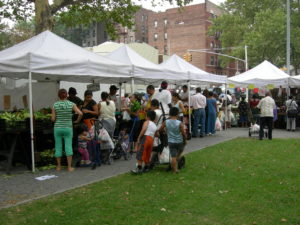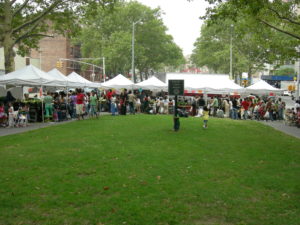Harvest Home Farmer’s Market: Making Local Agriculture Accessible to All
Connecting farmers with under-served communities provides access to healthy food for needy neighborhoods and new avenues of profit for farmers.
Danny Morgiewicz of Morgiewicz Farms in Goshen, NY has been raising an impressive assortment of produce that he markets directly to a loyal customer base for the past 15 years. And while some of that customer base is in the farmer’s markets of lower Manhattan and Brooklyn, a significant portion of his farm-fresh produce can also be found brightening the tables of low-income neighborhoods in Harlem, Coney Island, and the Bronx. In spite of long hours, rush-hour traffic, and weather-related worries that accompany any farming operation, direct-to-customer sales are what have allowed Morgiewicz to expand his crop plan to include many diverse offerings. Some crops, such as parsley and cilantro, specifically satisfy the demand of ethnic communities his products reach, and others are broadly popular with the general public. More personal and more profitable than wholesale for Morgiewicz, that direct relationship with his customers is part of what makes selling at markets worth it: “One of the rewarding aspects of retail sales is dealing with the people. When you do wholesale, you’re just a number on a sheet.”
These days it seems almost beyond belief that with the multitude of hardworking and creative farmers like Danny and his brother Joe, and with many more talented fishermen, cooks, bakers and more just a short drive away, some NYC neighborhoods are still considered “food deserts,” where residents have few options for healthy eating. In fact, there are nearly 1.7 million city residents who, according to a recent U.S. Census Bureau report, have incomes below $18,530 for a family of three – meaning that they often struggle to put food on the table.
Connect with Harvest Home
Harvest Home currently operates markets in the Bronx, Brooklyn, Manhattan, and Queens and accepts Supplemental Nutrition Assistance Program benefits (SNAP)/EBT Women Infant and Children Farmer’s Market Nutrition Coupons (WIC-FMNP), Senior Farmer’s Market Nutrition Coupons and Health Bucks. New farmers and vendors are actively encouraged to apply, particularly producers of meat, dairy, and value-added products such as honey, preserves, pickles, oils, nut butters, spices, canned or cured products, baked goods and more. For more information on Harvest Home Farmer’s Market, visit www.harvesthomefm.org, contact (212) 828-3361 or info@harvesthomefm.org.
With the slogan: “We envision a world in which all people are healthy,” Harvest Home Farmer’s Market (Harvest Home) is one tangible step towards closing the “food gap”—the chasm that exists between the food systems available to the poor, and those available to everyone else. In spite of the current attention being given to health (and taste) benefits of locally produced food, fresh produce still remains a luxury out of reach to many who lack the means to afford good quality food. Harvest Home, which operates New York State’s largest network of farmer’s markets in low-income neighborhoods, reinforces its market activities with community wellness projects such as cooking demonstrations. Harvest Home regularly witnesses the real-life circumstances behind the statistic that more than 3 million New Yorkers live in food-desert neighborhoods. These neighborhoods have very limited access to good quality produce – many residents’ nearest marketplaces are bodegas that sell a few vegetables, often wilted – along with a prevalence of fast food. The result is high concentrations of diet-related health problems like diabetes, obesity and hypertension. Better-supplied supermarkets are often a long bus or taxi ride away, and the time and money necessary to get there render them out of reach. And while many people who live in poor areas would be happy to eat healthier meals, they often need clear, practical information about how to cook fresh produce on limited budgets and they need to understand that healthy eating does not mean abandoning their ethnic traditions. Just as importantly, parents and children must experience for themselves the pleasure and fun of preparing and eating healthy family meals. Expanding the variety of products offered so that markets can become one-stop-shops can allow shoppers to stock their pantry or prepare a complete dinner from one location. This benefits farmers too, as the most successful markets are also the most diverse.

Shoppers check out produce at a Harvest Home Farmer’s Market. Photos by Harvest Home Farmer’s Markets
From a farmer’s perspective, working with markets, especially those in low-income communities, presents a unique set of challenges as lower-income markets cannot always command the same prices as markets in more affluent neighborhoods. For some growers, a successful strategy has been keeping prices stable throughout the season, even as prices at supermarkets may fluctuate. This benefits the farmer by creating a loyal, dependable customer base, and benefits the consumer by allowing him the ability to consistently budget for food purchases. It can take some outside-the-box thinking to come up with creative solutions that make sense to both farmers and shoppers. For instance, in 2013 a grass-fed beef producer brought more expensive cuts of meat to farmer’s markets in lower Manhattan, tailoring his offerings for lower-income neighborhoods by diversifying the cuts of meat offered.
With emphasis on more affordable cuts of meat in quantities that could feed a family, his meat products began regularly selling out. With a bit of flexibility and an open-mind, this type of market could be a great fit for both farmers with an existing market schedule (allowing them to expand their sales potential by hitting new markets on the same travel days) and for new farmers looking to test the waters of selling at farmer’s markets. Other modifications that can help make these kinds of markets more accessible to farmers include offering vendors the option of signing up either for a seasonal slot (i.e. one who comes to a market every week for the entire season) or for a daily slot, one who comes on a less rigorous schedule, such as every other week, on a “drop-in” basis. Knowing that one-size doesn’t fit all when it comes to market schedules and having a willingness to consider each participant on a case-by-case basis can be essential in providing a quality experience for every vendor, since the needs of a vegetable grower may be quite different than those of a beef producer or a baker.
Being willing to adapt based on farmer feedback is also a valuable tool to ensuring the success of farmer’s markets in any neighborhood. One challenge brought to light by many farmers is the lack of available workers to help sell their products. This labor shortage problem resulted in an innovative partnership between Harvest Home and Hostos Community College’s Continuing Education Department to establish a certificate program that will train residents in the skills necessary to work at farmer’s markets and farmstands. The program will provide a reliable source of workers to assist market operators and farmers with market duties such as managing markets, staffing tables, and processing payments. This will help ease some of burden on vendors who face a labor shortage at markets.
With a creative and flexible outlook, markets in lower-income neighborhoods can be a win-win situation for farmers and shoppers alike. Through organizations such as Harvest Home Farmer’s Market, farmers can take advantage of new opportunities to expand their sales into places that otherwise would be inaccessible. Even more importantly, it allows fresh, local food to become a staple in the diets of children and families who are otherwise denied access to high-quality nutritional food. Combining access to healthy food with the education needed to best utilize these newly-available resources allows market patrons to make good nutritional choices and make culinary use of a variety of agricultural products as they come into season.
Danny Morgiewicz agrees, “People need to understand we’re a seasonal farm, everything we bring to market is guaranteed fresh off our farm. Anyone is welcome to inspect our farm. Our door is always open.”


